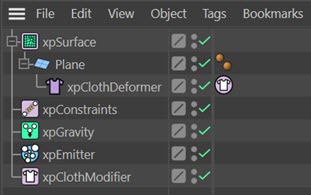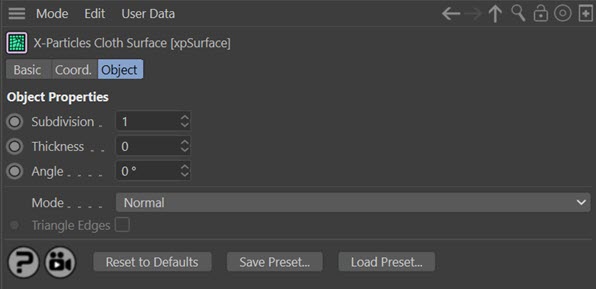Cloth FX: Cloth Surface
This is a generator object which can alter the mesh used as the cloth object. When you add this object to the scene, you must make the cloth object a child object of the Cloth Surface, like so:

Using Cloth Surface with xpShatter
If you need to do this, please see the page 'Using xpShatter with Cloth Surface' below.
Interface
The object's interface looks like this:

For the buttons at the bottom of the interface, please see the 'Common interface elements' page.
Parameters
Subdivision
Increasing this value subdivides the object, giving more mesh detail. This is fully parametric. Set it to zero to prevent any subdivision. Note that the more you increase this setting, the greater the number of points in the cloth object and the slower the simulation.
Thickness
Increasing this value will add thickness to the object. This does not increase the number of segments in the thickness, which depends on the subdivision setting. For example, a subdivision of zero gives 1 thickness segment, a subdivision of 1 gives 2 segments and so on (technically, a subdivision of n will give 2^n thickness segments).
Angle
This setting will bevel the corners and edges of the mesh. In order to see any effect, you should add some thickness and have a subdivision level of at least 1.
Mode
This drop-down menu controls additional appearance of the mesh when tearing is used (see the Cloth Tag for details of tearing).
The options are:
Normal
Tearing is unaffected.
Remove Single Polys
Sometimes, tearing will result in single polygons being split from the mesh. This is unsightly. If you choose this option, these single polygons are deleted (you will still see the particles associated with them but that doesn't matter).
Hide Polygons
This is similar to 'Remove Single Polys' but instead will hide groups of polygons which become disconnected.
Triangle Edges
If 'Mode' is set to 'Hide Polygons' this options becomes available. It will fill in sharp corners caused by the tearing with a triangle of polygons to give a smoother result.